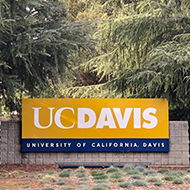UC Davis raising funds for new veterinary hospital

The campaign aims to raise £500 million towards a new veterinary hospital.
A decade-long campaign to raise more than $500 million to create a new veterinary hospital is underway at the University of California, Davis.
The UC Davis School of Veterinary Medicine is taking a lead role in the campaign, titled “Expect Greater: From UC Davis, For the World.” It is the largest philanthropic endeavour in the university’s history, and the school’s 25 per cent portion of the goal is also its biggest fundraising challenge.
Since the launch of the campaign in 2016, the university’s closest donors and friends have given $1.2 billion toward the goal, with more than $250 million of that raised by the veterinary school. Now UC Davis is reaching out to the entire university community and beyond to help make a greater impact on the world.
Opened in 1970, the school’s existing Veterinary Medical Teaching Hospital was built to see 3,000 patients per year. While there have been additions to the facility over the years, the hospital’s caseload has increased more than 1,600 per cent to more than 50,000 cases per year.
“This caseload increase is stretching our personnel and resources to an extreme extent,” said Dr Karl Jandrey, associate dean of Admissions and Student Programs and a critical care specialist in the hospital’s Emergency Room. “Our large and diverse caseload provides a tremendous learning environment for our students and house officers, but we have to ensure those opportunities are not jeopardized by the limited footprint in which we train them.”
The multi-phased Veterinary Medical Center campaign commenced over the past two years with several Phase I renovation projects in the hospital - including six new examination rooms, a feline-only suite, laundry and support facilities, locker rooms, and restrooms - and the construction of a new Large Animal Support Facility.
The school aims to continue Phase I in 2021, commencing with the construction of the All Species Imaging Center, where the world’s largest veterinary radiology team will diagnose patients and train students and residents.



 The latest
The latest